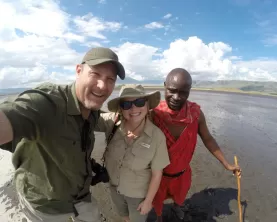
Here are a few good tips about coping with high altitude on your Adventure Life tour. This is not meant to substitute for trained medical advice or attention. Please consult a physician before traveling to altitude.
When finding yourself at a higher altitude then you are accustomed to there are a variety of special medical problems and considerations that you might run into. A good tip is to take it easy the first couple of days in order for your body to adjust to the change of altitude.
Common outdoor hazards, like sunburn and dehydration, are dangerous and should be taken seriously. By protecting yourself from the sun with SPF 30 or higher and drinking plenty of bottled water, you can help prevent these hazards. In high elevations you will find both less protective atmosphere in the form of a thinner ozone layer and high surface reflectivity in the form of snow and ice. Symptoms of dehydration can include headache, nausea and impaired cognitive function. Altitude also presents special problems not found at lower elevations. Many visitors to elevation experience shortness of breath, loss of appetite and fatigue.



















